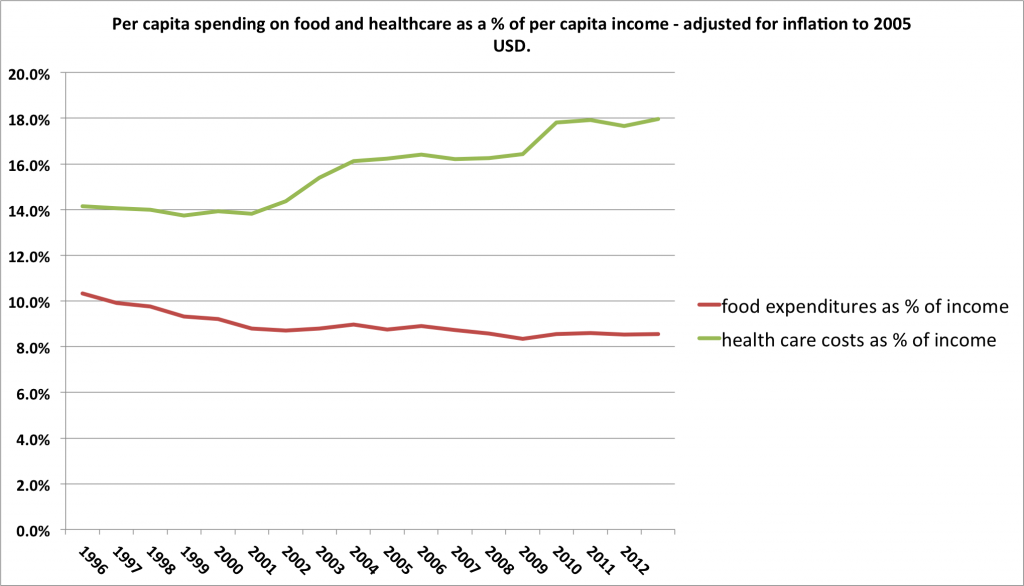Another podcast inspired post. I discovered Tom Woods recently from a Facebook fan page on homeschooling (he’s coming out with a pretty interesting history course for the Ron Paul curriculum) and subscribed to his podcast. I listened to a few episodes on the way to work today (nice that they are only 30 minutes long) to get a sense for his show (so far so good). One episode that caught my attention was an interview with Joel Salatin. In the interview he says around the 6 minute mark that “the US spends less on food per capita than any other country and more on healthcare”.
That struck a cord with me since I’ve been doing some thinking lately on how much the way we measure something impacts the choices we make. There is the old saw (from either Hewlett or Packard I think) ‘what get’s measured gets done’ and while I think that’s true, I think what is more valuable to understand is that the way things are measured determine what gets done.
Before looking deeper into the choices most Americans are making about healthcare and food, lets look at another example: the cars that most Americas choose to drive, or more specifically the fuel their engines use. I purchased my first diesel passenger car nearly 9 years ago, a 2006.5 VW Jetta TDI. A year later, I bought a (used) 2000 F-250, also a diesel vehicle. Just a few years ago I purchased a MB E320 Bluetec for my wife, completing the conversion – every vehicle my family owns is an oil burner.
When most people find this out, they usually ask me something along the lines of ‘isn’t that expensive? Diesel costs way more than gas.‘ My answer always consists of some form of the following:
- Yes, diesel fuel does cost more than gas – anywhere from 10-30% more (as I type this, my local corner gas station has 87 octane for $3.49 and diesel for $4.09 = 17% price differential).
- The Jetta is available in both a gas and diesel edition. According to published numbers the 2006 gas version got 22 MPG city and 30 MPG highway = a straight average of 26 MPG. According to the same numbers the diesel version gets 36 MPG City / 41 Highway = 38.5 MPG average (although I regularly get 42-45 MPG). Using the standard numbers, the diesel version gets 48% more MPG than its gas cousin.
- Since I really don’t care how much it costs me to fill up, but rather what it costs me to go a mile. As long as diesel is no more than 48% more expensive than gas, its actually cheaper for me to have diesel cars than gas if I measure things based on what it costs me to go a mile vs. what it costs me to fill up my tank.
- And this is to say nothing of the time I save by only filling up less often (it adds up over the life of the vehicle), the lower maintenance costs (oil changes only every 10K) and the longer service life of the vehicle (I have 225K on my TDI, 213K on my F-250 and nearly 100K on the MB…and they are all running like tops).
So back to food and healthcare. Although I have every reason to trust what Joel said on Tom’s podcast, I also have an inquiring mind and access to google so I set out to get some more detail on how much Americas spend on food vs. healthcare. A few quick searches and downloads, followed by some spreadsheet work and I arrive at this:

The red lines shows the % of income spent by Americans on food since 1995. The green line shows the % spent on health care in the same time period. I was able to find data for income and health care spending that was already inflation adjusted to 2005 dollars – I had to use an inflation calculator to adjust the food spending data from inflation adjusted data normalized to 1988.
In the 17 years between 1995 and 2012 the % of income Americans spend on food has dropped 1.8% while the amount they spend on healthcare has increased 3.8%. Nearly every percentage point of income less we spend on food means a two point increase in the amount we spend on healthcare. I am not trying to confuse correlation with causation – however I’ve made the decision to measure things a little differently here too: its not the cost of a meal that I am most worried about – its the effects, both near and long term that matter most.
I make the choice to spend more on milk straight from a farmer because I know that it makes my family healthier. I make the choice to spend 2-3x on grass fed beef because I know that it has a far better nutrient profile (not to mention is a better cared for animal). I make the choice to grow some of my own vegetables and get the rest from known, local sources because I know that my body is setup to eat non-GMO foods that aren’t sprayed with chemicals. All of that costs me more when measured in dollars – but far less when measured in terms of things that actually matter.
Leave a Reply